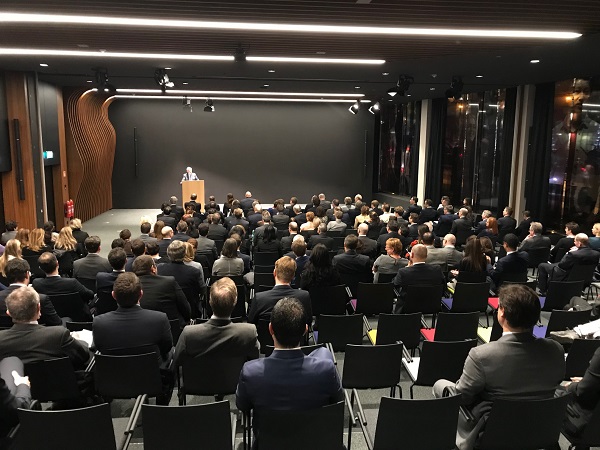
On Wednesday 29 November, Arendt & Medernach in Luxembourg-Kirchberg hosted an event organised by the British Embassy in Luxembourg on the issue of Brexit.
The Chancellor of the High Court of England and Wales, Sir Geoffrey Vos, delivered a speech on the topic of “The future for the UK’s jurisdiction and English Law after Brexit” to an audience of over 200 people.
The British Ambassador, John Marshall, talked about Brexit affecting businesses, individuals and communities. He said that we are approaching a key milestone for the exit from the EU with the EU Council in mid December. He believes that good progress has been made on the three main areas, i.e. citizens’ rights, Ireland and the divorce settlement, for the future relationship to be discussed. "And here this evening is a speaker who understands the legal issues involved" he stated as he introduced the speaker.
Sir Geoffrey Vos introduced himself and the structure of the judiciary, etc., which he described as a large and diverse exercise in which the courts sit across 7 different centres in England and Wales. He has a long history of working with European judges; he remarked that some countries have different approaches to judicial governance.
An independent judiciary is crucial for businesses to invest, he stressed; it is also critical for deciding on issues between the state and individuals and businesses. Therefore judges must be separate from the state, from the executive and administrative arms of governance.
On the aspect of common law, he said that legal systems should not be in competition with one another. He referred to English-language courts being established in Frankfurt, Paris, Brussels, etc., and encouraged dialogue for representatives of the judiciary to work together. Common law is based on a system of judge-made principles and refers to previous court decisions. He also referred (on a number of occassions) to Blockchain technology being used in the future in relation to common law and recording proceedings and judgements.
He stressed that the issue of common law being weakened after Brexit is a misconception. However, English civil law will begin to differ from European law after Brexit.
Secondly, Brexit from a judicial perspective: he stressed that it is the politicians, not the judiciary, who decide on the future (i.e. re Brexit) and it us up to the judiciary to provide a good service to those who use the law and courts, by operating the justice system. The challenges need to be addressed, including citizens rights, financial passporting, to name but a few. The judges, however, can point out the issues that need to be resolved, but must not draft future legislation.
The senior judiciary in England have formed a committee to advise the government on what solutions need to be brought about, including citizens’ rights, IP, arbitration, etc. An alternative dispute resolution (ADR) system is a controversial area in some EU countries so judges and people in different Member States have different views on using ADR which should be a cost-effective method for a quick outcome, for different types of disputes; acceptance of ADR across the EU and the UK is very important. He added that the UK and EU Member States should have mutual systems in place.
The judiciary in the UK sees the future of dispute resolution as vital. He stressed the need for a fast system to be devised quickly, with small claims, divorces and guilty pleas in criminal cases all to benefit from an ADR. With blockchain, smart contracts will need a legal backbone, with Millennials expecting fast solutions. He also referred to the emergence of predictive technology to be used to identify the most likely outcome of litigation. He claimed that predictive technology will have a major impact on cases being brought to court.
He stressed that the judiciary in England and Wales cannot be seen to be complacent and is moving fast to ensure businesses in the UK and the EU will be able to rely on independent and competent judiciary.
He concluded by stating that the judiciary does understand the problems that are arising. Asked if the UK will continue to adopt EU regulations into law after Brexit, to ensure similar systems, he responded by claiming that this is a political issue and one he could not answer. Other questions from the floor addressed arbitration and dispute resolution, including what court(s) would be referred to regarding an appeal, etc., for cases being heard (but not yet concluded) by the European Court of Justice on the date Britain leaves the EU.
The event was followed by a reception.








